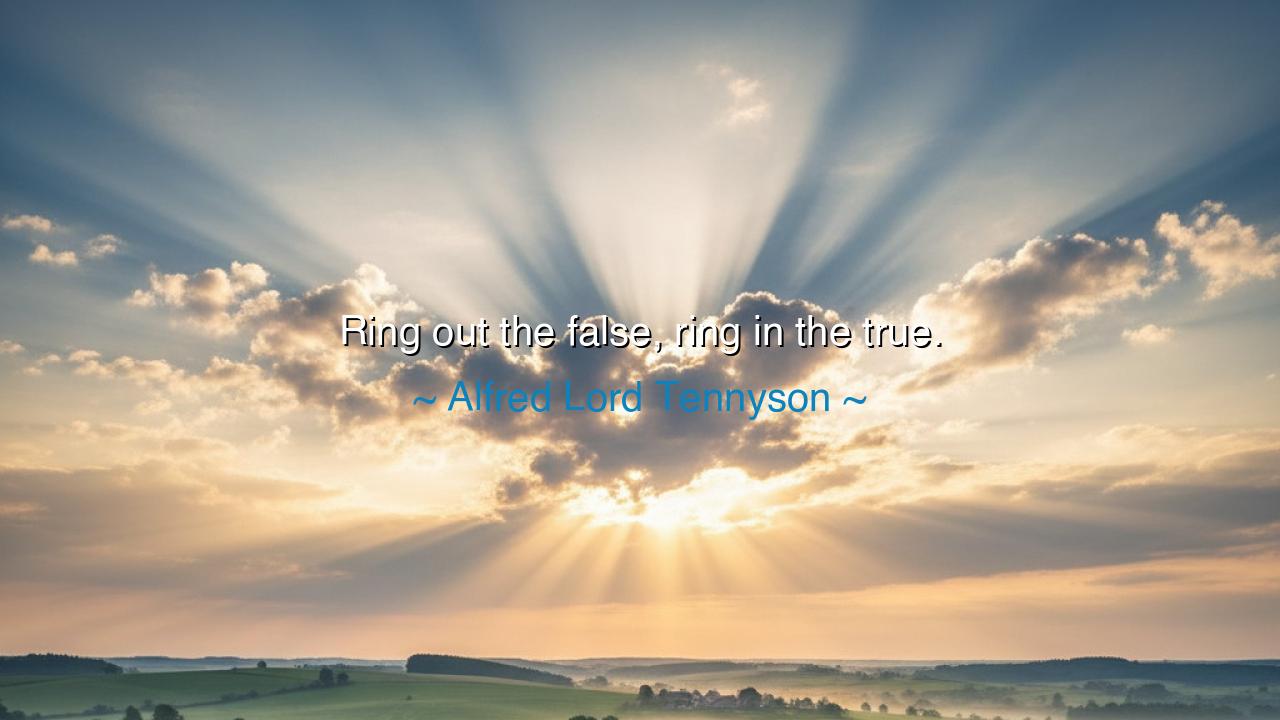
Ring out the false, ring in the true.






Hear the solemn cry of Alfred Lord Tennyson, who in his immortal verse declared: “Ring out the false, ring in the true.” These words, though brief, resound like the tolling of a great bell at the turning of an age. They are both prayer and command, a call to cast aside falsehood, corruption, and decay, and to welcome truth, justice, and renewal. Tennyson wrote these lines in his poem In Memoriam A.H.H., composed in grief for his departed friend, but they grew to become more than private mourning—they became a hymn for humanity’s longing for rebirth at the dawn of a new year.
The meaning of the words is clear and powerful. The “false” stands for all that is hollow, deceitful, and destructive—lies told in politics, hypocrisies in religion, selfishness in human hearts. To “ring it out” is to banish it as the bells banish darkness with sound, to let it die with the year that has passed. And the “true” is the opposite: honesty, righteousness, love, and faith. To “ring it in” is to welcome it like a guest of honor into the threshold of life renewed. Thus, the line is both lament and hope, a demand that each year we purify ourselves and our world.
The origin of these words rests in Victorian England, where Tennyson, as Poet Laureate, gave voice to the anxieties and aspirations of his people. His era was one of upheaval—science challenged old faiths, industry changed the face of society, and grief often shadowed the human heart. In such a world, the image of the ringing bells at midnight became a symbol of transition. Just as bells toll to mark death and also to celebrate marriage, so here they serve as heralds of renewal: the death of the false, the marriage of humanity to truth.
History itself provides an echo of this wisdom. When Abraham Lincoln declared that a nation could not endure “half slave and half free,” he too was calling to ring out the false—the cruelty of bondage—and ring in the true—the promise of liberty. The Emancipation Proclamation, signed on the first day of a new year, was itself a bell rung for justice, a sound of hope rising above centuries of sorrow. Thus, Tennyson’s words are not poetry alone, but prophecy fulfilled whenever people choose truth over falsehood.
These words also speak not only to nations but to individuals. Each of us carries within a battlefield of falsehood and truth—illusions we cling to, habits that chain us, excuses that blind us. To “ring out” these falsehoods is the work of courage and honesty. To “ring in” truth is the work of humility and strength. For the bells do not toll only in distant towers; they must toll within our souls, reminding us that every day can be the first of a new life.
The lesson is timeless: renewal requires rejection. One cannot embrace truth while clinging to falsehood. Just as the new year demands the letting go of the old, so too must the heart learn to cast out lies if it would welcome light. To live by Tennyson’s wisdom is to examine ourselves and our world, asking: What must be banished? What must be embraced? What falsehoods must die, that truth may live?
Therefore, let us act with intention. Let us be the bells that ring out corruption, hatred, and deceit, and ring in justice, compassion, and honesty. Let each choice, each word, be a tolling sound that casts away the shadows and welcomes the dawn. For as Alfred Lord Tennyson taught, in the great turning of time, humanity is called not only to mark the passing of years, but to purify its soul: Ring out the false, ring in the true.






AAdministratorAdministrator
Welcome, honored guests. Please leave a comment, we will respond soon